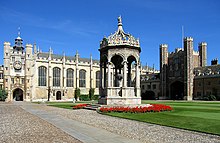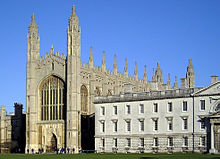Cambridge Apostles

The Cambridge Apostles , also known as the Cambridge Conversazione Society and The Apostles , is an elite intellectual secret society at Cambridge University and was founded in 1820 by George Tomlinson on the model of a Masonic lodge .
This secret society was named Cambridge Apostles because it was supposed to bring together the twelve most talented students at Cambridge University; it was a reference to the twelve apostles . The active members are mostly freshmen. Society was traditionally based at King's College and Trinity College , which is no longer the case today.
Activities and membership
The Cambridge Apostles were essentially a debating club . Meetings were held once a week, traditionally on Saturday evenings, with a member giving a talk on any topic and later leading a discussion on that topic. During the meetings, sardines were eaten on toast, which they called "whales". There were no restrictions on the subject of the lecture - neither moral, legal nor ideological limits should hinder the freedom of the lecture.
Since their founding, the apostles kept a leather diary in which a secretary recorded the topics discussed. The active members, who are predominantly students, are called "Apostles", former members are called "Angels". As a rule, the "apostles" became "angels" when they completed their studies or accepted an assistant position accompanying a doctoral degree. "Angels" then looked for new members among the students. Every year, in the greatest secrecy, all “Angels” were invited to an “Apostles' dinner” in a Cambridge College.
Students considered for membership were referred to as " embryos " and invited to "embryo parties" where existing members decided whether or not to accept an "embryo". The students attended these parties without knowing they were being considered for membership. To become an "Apostle" one had to take an oath of secrecy and listen to a lecture originally written by the Apostle Fenton Hort (theologian since 1851).
There were few female members. The first woman (an American PhD student in social anthropology) became a member in 1985, 165 years after the Cambridge Apostles were founded.
Critics say that the secret nature of the apostles, along with the small number of female members and the significant proportion of "Angels" who have received scholarships at Cambridge, as well as posts in the media, government, and church, set the meritocratic ideals of the University would be undermined. Former members spoke of a lifelong covenant that bound them together. The philosopher Henry Sidgwick wrote in his memoir about the apostles: “the tie of attachment to this society is much the strongest corporate bond which I have known in my life” (the bond to this society is the strongest that I have known in my life have).
The Cambridge Spy Ring
The Cambridge Apostles became known in 1973 through the Cambridge Spy Ring. In 1979 Prime Minister Margaret Thatcher stepped before the House of Commons and publicly proclaimed one of the greatest espionage scandals in British history to MPs. At least four men who had access to the highest levels of British government (two of whom were former apostles) were found to have passed information to the KGB . The four secret agents were: Guy Burgess , an MI6 officer and secretary to the assistant secretary of state; Anthony Blunt , MI5 officer, director of the Courtauld Institute and art advisor to the Queen of England ; Donald MacLean , Senior State Department official ; and Kim Philby , MI6 officer and journalist.
Although only four men were exposed, there were rumors of a fifth man, allegedly a senior officer in British intelligence, who was never found. Many of these rumors referred to Victor Rothschild (1910–1990), another apostle, who set up premises in London for the spy meetings. However, there was no evidence that he knew about the espionage activities. The American writer Michael Straight (1916-2004), former editor of New Republic magazine , was also temporarily suspected in this context.
Among the spies mentioned there were two homosexuals , Guy Burgess and Anthony Blunt, who were both members of the Cambridge Apostles . At that time it was said that the secret society was shaped by homosexuality and Marxism . The communist Anthony Blunt was the first to be recruited by the KGB in 1933 when he was in the Soviet Union. Back in Great Britain, on the instructions of the KGB, he quickly recruited more students in Cambridge, including Michael Straight. According to the writer Russel Aiuto , it should not have been Blunt who recruited Burgess, Philby and MacLean.
former members
Cambridge Apostles were (year of accession in brackets, if known):
- Noel Annan , Member of MI5 and Rector of the University of London
- Julian Bell , poet
- Francis Birrell , critic and journalist
- Anthony Blunt , art historian and double agent (MI6 and KGB spy)
- Rupert Brooke , lyric poet (1908)
- Arthur Buller , lawyer
- Charles Buller
- Guy Burgess , Double Agent (MI6 and KGB)
- Erasmus A. Darwin , brother of Charles Darwin (1823)
- Goldsworthy Lowes Dickinson , historian and philosopher
- Edward Morgan Forster , writer (1901)
- Roger Fry , painter and art critic (1887)
- Arthur Hallam , lyric poet (1829)
- Godfrey Harold Hardy , mathematician
- Eric Hobsbawm , historian
- Fenton Hort , theologian (1851)
- Aldous Huxley , writer
- John Mitchell Kemble , historian
- John Maynard Keynes , economist
- Paul Levy (writer) , restaurant critic
- Geoffrey Lloyd , classical philologist
- Frederick Denison Maurice , literary scholar and theologian
- James Clerk Maxwell , physicist (1852)
- Desmond MacCarthy , columnist and critic
- John McTaggart Ellis McTaggart , philosopher
- Charles Merivale , historian
- George Edward Moore , philosopher (1894)
- Raymond Mortimer , art critic and journalist
- Victor Rothschild , banker
- Bertrand Russell , philosopher (1892)
- John Tressider Sheppard , classical philologist
- Gerald Shove , economist (1909)
- Henry Sidgwick , philosopher (1857)
- CP Snow , writer and physicist
- John Sterling , writer
- James Strachey , journalist (biographer Sigmund Freuds )
- Lytton Strachey , writer and critic (1902)
- Michael Straight , publicist and KGB spy
- Alfred Tennyson , writer
- Stephen Tomlin , sculptor
- George Tomlinson , theologian (1820)
- Richard Trench , writer and theologian
- George Macaulay Trevelyan , historian
- Robert Trevelyan , poet and translator
- Saxon Sidney Turner , writer
- Arthur Waley , sinologist and historian
- Leonard Woolf , publisher and writer, husband of Virginia Woolf (1902)
- Brooke Foss Westcott , theologian
- Alfred North Whitehead , mathematician and philosopher (1884)
- Ludwig Wittgenstein , philosopher (1912)
literature
- Peter Allen: The Cambridge Apostles. The Early Years. Cambridge University Press, Cambridge 1978. ISBN 978-0-521-21803-0
- Paul Levy: Moore: GE Moore and the Cambridge Apostles. 1980. ISBN 978-0-03-053616-8
- Richard Deacon: The Cambridge Apostles. A History of Cambridge University's Elite Intellectual Secret Society. Farrar, Straus and Giroux 1986. ISBN 978-0-374-11820-4
- WC Lubenow: The Cambridge Apostles, 1820-1914. Liberalism, Imagination, and Friendship in British Intellectual and Political Life. Cambridge University Press 1998. ISBN 978-0-521-57213-2
Web links
- A Cambridge secret revealed: the Apostles in: King's College, Cambridge, January 2011
Individual evidence
- ↑ Fred Sommer: Anthony Blunt and Guy Burgess, Gay Spies. In: Journal of Homosexuality 29, 1995, pp. 273-294.
- ↑ Russell Aiuto, The Cambridge Spies, in the web archive ( Memento from January 20, 2005 in the Internet Archive )

